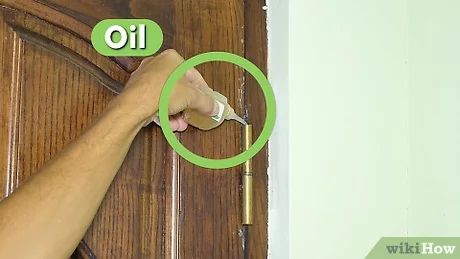Squeaky door hinges can be annoying, but thankfully there are some easy solutions to stop the squeaking for good. In this article, we’ll go over the most common causes of squeaky hinges and the best ways to fix them.
Page Contents
What causes squeaky door hinges?
There are a few common culprits behind squeaky hinges:
- Dryness – Lack of lubrication is the most common reason hinges start to squeak. Over time, the natural lubricants wear away leaving the metal parts to rub against each other.
- Looseness – If the hinge screws are loose, it can cause the hinge parts to misalign and rub together as you open and close the door.
- Corrosion – Rust, calcium deposits or other corrosion on the hinge pins can interfere with the smooth movement of the hinge.
- Warping – Door frames and doors can warp slightly over time due to moisture or settling. This alters the alignment of the hinges and causes friction and squeaking.
How to stop squeaky hinges
Here are 5 simple, DIY solutions for quieting noisy hinges:
1. Use penetrating oil
Oiling the hinge pins is one of the easiest solutions for stopping squeaks. Any lightweight household oil like WD-40 or 3-In-One oil can work. The key is using a penetrating oil that can seep deeply into the tiny gap between the pin and the knuckle. Here are the steps:
- Open the door so you can access the hinges.
- Place a few drops of oil directly on the hinge pin and let it soak in for 10-15 minutes.
- Wipe away any excess oil.
- Slowly open and close the door a few times to distribute the oil.
The oil will lubricate the metal surfaces and should stop any squeaking. Reapply oil if the squeak comes back.
2. Lubricate with grease or wax
For longer lasting lubrication, use a thicker grease or wax instead of oil. These will stick to the hinges longer:
- White lithium grease – Available at hardware and auto parts stores. Apply a small dab with a cotton swab.
- Petroleum jelly – Less messy than grease. Rub a small amount on the hinge knuckle.
- Paraffin wax – Light candle wax along the hinge pin. As the door moves, the wax will spread.
3. Tighten loose hinge screws
If the hinge is loose, tightening the screws can help realign the hinge parts and reduce friction and squeaking. Use a screwdriver to tighten the screws incrementally in a crisscross pattern. Don’t overtighten – just tighten enough so the hinge feels snug.
4. Adjust hinge placement
If tightening the screws doesn’t help, the hinge itself may be slightly misaligned. You can fix this by:
- Removing the hinge screws and shimming behind the hinges with pennies or small washers.
- Filling existing screw holes with wood glue and toothpicks. Drill new pilot holes once dry.
- Sanding or planing the door edge that binds against the frame.
5. Replace corroded hinges
Heavily corroded or worn out hinges that don’t move smoothly should just be replaced. New hinges are inexpensive at hardware stores. Make sure to get the same size, style and number of screw holes as the existing hinge.
Preventative maintenance
To prevent future squeaks, add hinge lubrication to your regular home maintenance routine. A few other tips:
- Use high quality hinges when installing new doors.
- Seal any gaps around hinges to prevent moisture getting in.
- Open and close doors completely each time to evenly distribute wear.
Conclusion
Stopping those annoying squeaky hinges is usually a quick, easy fix. In most cases, you just need to lubricate the hinge pins or tighten loose screws. Penetrating oil is great for a quick fix while wax and grease provide longer lubrication. Adjusting or replacing the hinges are good options if lubrication doesn’t work. And be sure to maintain the hinges regularly to prevent future squeaks. Your doors will open and close silently with just a little TLC for those hardworking hinges!
